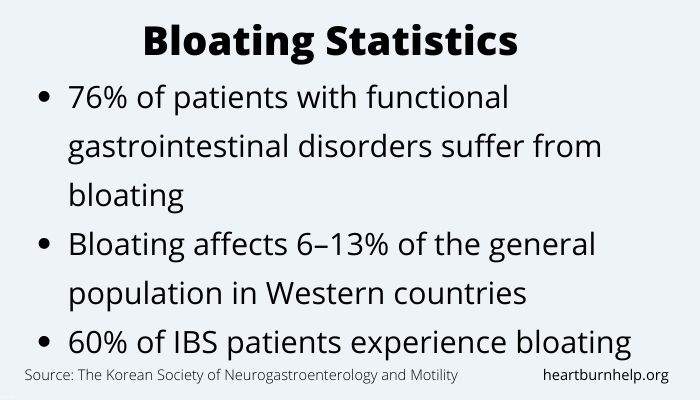A cup of green tea is good for a bloated stomach and other digestive issues. However, if you are prone to acid reflux, you’ll need to be careful not to drink too much green tea. This article explains how green tea can help stomach bloating, and when to drink it for best results.
What is bloating?
Bloating is a common symptom of people with digestive problems. In particular, 76% of subjects with irritable bowel syndrome (IBS) complain of bloating, and 6-13% of the general population suffer from stomach bloating (1).
Bloating is the feeling you get when your stomach feels overly full or stretched due to an accumulation of gas and may appear larger than it usually does.
You may also have:
- excess gas
- constipation
- burping
- diarrhea
- stomach ache
- abdominal pain
- upset stomach
What causes bloating?
Food, drinks, and medical conditions are the usual culprits that cause stomach bloating.
Irritable Bowel Syndrome causes bloating in 60% of sufferers (1). Ulcerative Colitis and Crohn’s Disease, the two main types of Inflammatory Bowel Disease, can often make you feel bloated and gassy.
Other digestive disorders that cause bloating include:
- Constipation or a sluggish bowel
- Gastroparesis is delayed emptying of your food into your small intestine often caused by low stomach acid.
- Not enough good bacteria in your gut causes bloating. If untreated this can lead to Small Intestinal Bacterial Overgrowth (SIBO) or Candida overgrowth.
Some foods contain indigestible sugars that upset your digestive system and cause stomach bloating:
- oligosaccharides in beans, onions
- raffinose in broccoli, cabbage, cauliflower
- sorbitol found in apples, sugar-free gum, artificial sweeteners eg. diet drinks
Food intolerance commonly causes stomach bloating:
- lactose intolerance – difficulty digesting lactose in cow’s, goat’s and sheep milk and other dairy products
- coeliac disease – difficult to digest gluten in wheat, rye and barley
A bloated stomach may also be caused by:
- eating too much
- alcohol
- carbonated drinks
- caffeine
- swallowing too much air, such as drinking with a straw
What is green tea?
Green tea, black tea, and oolong teas come from the Camellia Sinensis plant. The various types of teas are made by preparing the leaves differently. When making green tea, leaves are steamed, pan-fried, and dried.
Compared to other “true teas” from the Camellia Sinensis plant, green tea has the most health benefits, possibly because it is the least processed.
Green tea has been used for thousands of years in China and Japan and is known for its health benefits.
Why is green tea good for bloating?
Green tea extracts contain polyphenols, which is where the health benefits are derived. Most green tea polyphenols are flavonols, commonly known as catechins, and are found in greater amounts in green tea compared to black tea or Oolong teas.
Promotes Gut Health
If you suffer from bloating, you probably don’t have a good balance of good and bad bacteria in your stomach. Green tea improves gut health by boosting the production of good bacteria while inhibiting the growth of harmful bacteria that causes bloating and other digestive issues (3).
Other true teas such as black tea and oolong teas also promote healthy gut bacteria.
Reduces inflammation
Bloating is often linked with other digestive problems associated with inflammation in your digestive tract. Green tea extracts have anti-inflammatory properties to help relieve these conditions (4).
Reduces Stress
Stress can have a significant impact on your digestive system. Stress can tense your muscles, put pressure on your stomach, and cause bloating or gas. If you are stressed, the muscles in your digestive tract may spasm, which results in diarrhea or constipation.
Green tea contains theanine, an amino acid that significantly reduces stress; however, caffeine and catechins block theanine from working. To get any stress-reducing benefit, you need to drink low caffeine forms of green tea (5).
Other health benefits of green tea
Studies on green tea and green tea extracts suggest there are many health benefits associated with drinking green tea. However, more research is needed to prove the links.
Besides treating digestive issues, drinking green tea or taking green tea extracts on a regular basis may help treat the following conditions:
- cancer
- weight loss
- natural diuretic helps eliminate excess water
- diabetes
- cardiovascular disease
- neurodegenerative diseases
How much green tea should I drink?
How much green tea to drink depends on how your body responds to it. Too much green tea can give you an upset stomach.
Studies show five or more cups of green tea per day can have health benefits (6). However, if you have stomach bloating, you likely have other digestive issues, so fewer cups of green tea per day is a good idea.
If you suffer from acid reflux, which is often associated with bloating, your stomach may not tolerate green tea, or you may be able to drink one or two cups of green tea a day. The caffeine content of green tea may play havoc with your acid reflux.
You could try drinking low caffeine green tea, as it can help you reduce stress, which is often a significant factor in stomach bloating.
You will need to experiment to see what works for you. Start with half a cup of green tea and try more next time if your body responds well.
When to drink green tea for a bloated stomach
For best results, drink green tea between meals.
When NOT to drink green tea
Don’t drink green tea first thing in the morning or on an empty stomach, as it can give you nausea.
Green tea, or black tea for that matter, shouldn’t be drunk with meals because certain compounds in the tea affect iron from being absorbed from your food. It’s a good idea to wait at least an hour after eating before drinking a cup of green tea.
Don’t drink green tea at least two hours before going to sleep because the caffeine content could keep you awake.
Side effects of too much green tea
Too much green tea may cause stomach problems, especially if you drink too much on an empty stomach.
If you suffer from acid reflux, your stomach might not tolerate green tea. Green tea contains about half the caffeine of black tea. Caffeinated beverages increase stomach acid and relax your lower esophageal sphincter muscle, which aggravates symptoms of acid reflux.
Green tea may give you a headache or irregular heartbeat due to it’s caffeine content. Or poor sleep if consumed too close to bedtime.
If you drink lots of green tea on a regular basis, you may get an iron deficiency (9).

FAQS: Is green tea good for bloating?
Is matcha green tea good for bloating?
Matcha green tea is very high in caffeine. It may cause bloating if you have a sensitive stomach or are prone to acid reflux Matcha is high in tannins that can irritate your stomach and cause stomach acidity to rise, especially if you drink too much or drink too quickly on an empty stomach.
Is mint green tea good for bloating?
Peppermint green tea is good for stomach bloating and digestive issues, but peppermint and green tea may worsen your symptoms if you suffer from acid reflux.
Is jasmine green tea good for bloating?
Green tea is good for stomach bloating due to its anti-inflammatory properties and because it promotes gut health. Jasmine is sometimes added to green tea to boost health benefits and flavor. There are no specific compounds in jasmine that soothe a bloated stomach; however, there are none that make it worse either.
Is ginger and green tea good for bloating?
Ginger and green tea is a great way to relieve a bloated stomach naturally. Ginger speeds up your digestive system, which can reduce stomach bloating. And green tea can help improve gut health by introducing more good bacteria into your stomach to combat a bloated stomach.
Is lemon and green tea good for bloating?
Lemon and green tea can ease a bloated stomach Lemon and green tea both have anti-inflammatory properties, and green tea can help restore gut health. Both of which are essential factors in curing stomach bloating.
Best teas for stomach bloating
A delicious cup of tea is a great way to treat a bloated stomach. Herbal teas offer a range of health benefits and are among the best natural remedies for digestive issues.
Ginger Tea
Ginger root has a mild spicy flavor and is a popular traditional Chinese medicine used for treating digestive issues. Arguably, it may be the best tea for stomach bloating.
Consumption of ginger tea can increase gastric contractions, which speeds up the digestive process, and can help reduce stomach acid, excess gas, and bloating (1, 2, 3).
Ginger tea also has anti-emetic properties, which reduce feelings of nausea and indigestion and soothe an upset stomach. Ginger tea can also ease a bloated stomach and irritable bowel symptoms due to its anti-inflammatory properties.
Chamomile Tea
Chamomile tea is a gentle, soothing tea that is especially helpful in dispelling excess gas, soothing your stomach, and relaxing the muscles that move food through your gastrointestinal tract.
In people with irritable bowel syndrome, chamomile tea may help stomach bloating caused by foods that contain lactose.
Chamomile tea can also improve your sleep quality and relaxation, reducing stress, which is a significant risk factor for bloating.
Fennel Tea
Fennel tea is made by crushing fennel seeds. It contains antibacterial properties that eliminate bacteria that give you gas. It also has anti-inflammatory properties that can help soothe your digestive system (7).
Dandelion Root Tea
The entire dandelion plant may be used to make dandelion tea. However, most research has been done on the health benefits of dandelion root.
Dandylion root tea is a natural diuretic that helps you eliminate excess fluid and toxins, relieving bloating and gas.
Fresh Peppermint Tea
The anti-inflammatory properties of peppermint tea or peppermint oil help relax your stomach muscles and intestines to relieve bloating and gas. A warm cup of peppermint tea can also reduce the pain associated with a bloated stomach.
Lemon Balm Tea
Lemon balm tea is traditionally used to treat mild digestive system complaints, including bloating and gas (8). It can also aid sleep and calm anxiety.
Other natural ways to get rid of bloating
These lifestyle changes may be a permanent solution to your bloated stomach:
- avoid eating too much fibre, but you still need some in your diet
- eat small meals
- include probiotic foods or probiotic supplements to improve your gut health
- drink plenty of water
- physical activity will help get your digestive tract moving
- reduce stress by trying yoga or meditation
If you experience stomach bloating on a regular basis, it’s a good idea to seek medical advice.
Summary: Is green tea good for bloating?
A cup of green tea is good for bloating due to its anti-inflammatory properties and ability to improve gut health. If you drink low caffeine green tea, it can help you reduce stress, which is often a significant factor in stomach bloating.


